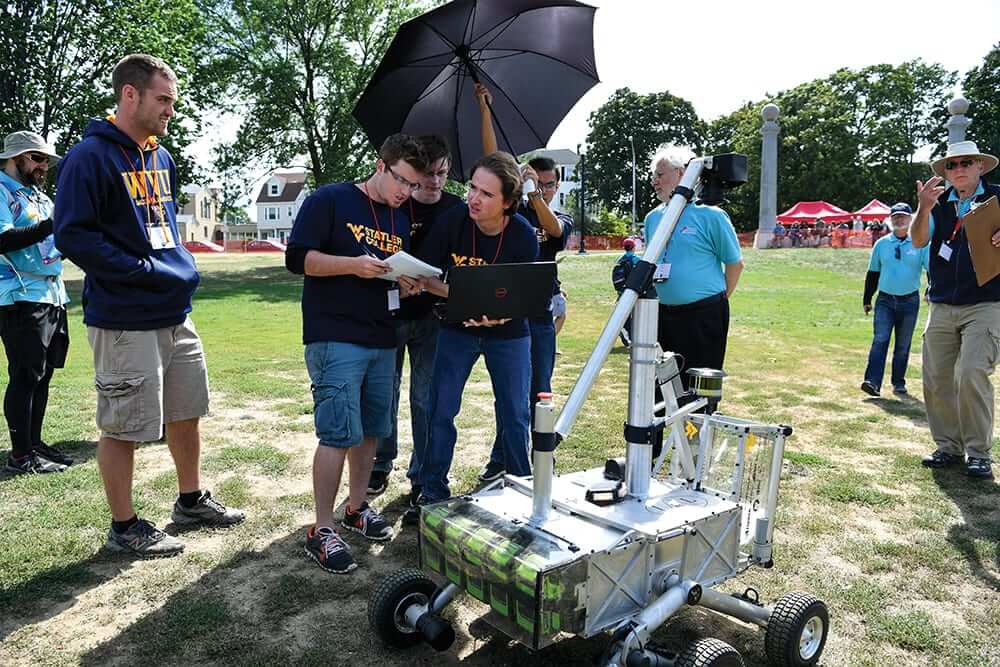Living-learning communities are helping WVU students make friends and connect with their passions.
➼ When college students feel engaged, they’re likelier to learn more, stay in school, and graduate on time, research shows. For big universities that have diverse student bodies, fostering that feeling of engagement is especially important—and especially elusive.
WVU believes it’s found one reliable path to engagement in its new living-learning communities. “LLCs are smaller, niche communities that promote academic success and student engagement within the residential environment,” explains WVU Associate Director for Residential Learning Tyler Gailey. “LLCs make a large campus feel small, I’ve heard President Gee say. We have students coming in from all over the state and country, and this helps them connect with other students and the institution.”
A more richly structured living arrangement than conventional dormitory life, an LLC unites students who share a given academic or social interest. It’s an idea that makes sense: By housing students together who have self-identified shared interests, an LLC offers ready study partners and the likelihood of natural friendships. And by organizing themed activities—lectures, discussions, workshops, service-learning projects—it extends learning beyond the classroom, making the full spectrum of campus resources more directly available to students.
Although it has deep roots in higher education, the living-learning community model has gained traction over the past decade, spreading to campuses nationwide. WVU’s LLC program got a strong start with eight communities in the 2017–18 year. The Honors College LLC is the largest. Others in the first year included Engineering, Creative Arts, True Colors for the LGBTQ community, and FirstGen, an LLC for students who are the first in their families to earn four-year degrees.
Each LLC is the unique product of a 12-to-18-month planning process. It starts with the requesting entity thinking through its goals, Gailey says, then naming a leadership team that researches how LLCs organized around the same theme or academic unit at other colleges operate. Later planning phases create the specific activities that students will be offered.
As a way of integrating residential life more fully into campus life, LLCs also support WVU’s Project 168. “You have 168 hours in a given week,” Gailey says. “Students aren’t always physically in a classroom, engaged in that way, but there are still plenty of opportunities in a week to have learning experiences. These communities are another way for students to engage in that with their peers.”
While it’s too soon to know how well the LLCs are helping students plug in, early signs look good. Gailey gives the example of the Forensic and Investigative Science LLC. “Students were taking introductory classes in the first year and didn’t get to engage much with faculty and the department,” he says. After the LLC started in fall 2017, the department posted a 5 percent increase in students remaining in the major after their first semester. “We have a baseline now from this past year, so we’ll be able to build cohorts and compare them across the board,” Gailey says. “We’re also working on ways we can qualitatively assess the experience students have through surveys or focus groups.”
But prospective students already love the idea, he says. “We’re hearing, and recruiters and the Admissions office are hearing, that for a lot of parents and students, this is something they’re excited about.”
New this fall is an Innovation LLC, organized through the university’s LaunchLab entrepreneurship center. Students in the Innovation LLC will design products, create business models around inventions, and learn about commercialization in an environment that emphasizes creativity, teamwork, and collaboration. Also new is a Health Professions LLC for students pursuing careers in professional health fields and related majors.
And LLCs are in planning now for the College of Business and Economics and the Davis College of Agriculture, Natural Resources, and Design, to be launched in fall 2019. By that time, nearly one-quarter of the 5,000 or so students in WVU housing will be participating in an LLC, Gailey says.
photo provided by West Virginia University
